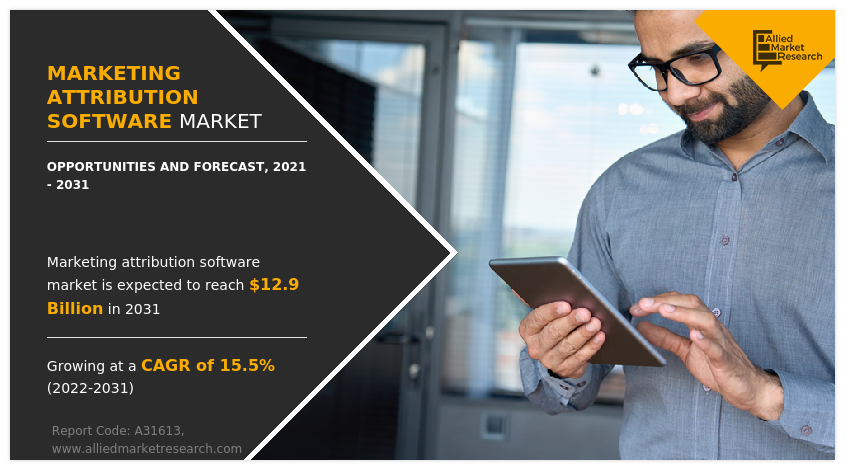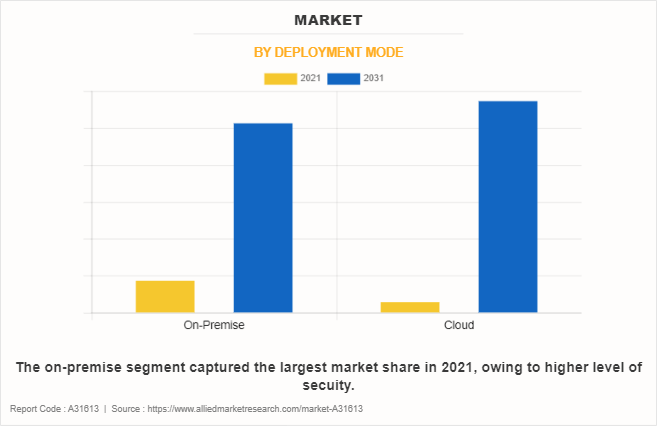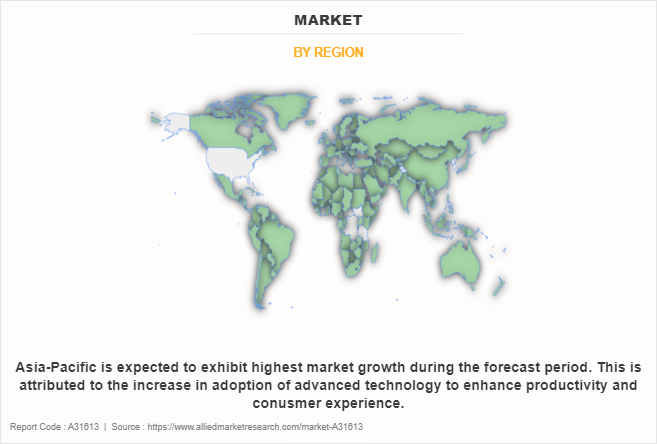Marketing Attribution Software Market Research, 2031
The global marketing attribution software market was valued at $3.1 billion in 2021, and is projected to reach $12.9 billion by 2031, growing at a CAGR of 15.5% from 2022 to 2031.
Marketing attribution software allows to evaluate marketing data to identify specific channels and campaigns that impact on revenue growth and then optimizing resources to maximize ROI. In addition, it also provides other benefits to the enterprises such as improve product development, improved personalization, optimized marketing spends, such benefits are expected to provide the lucrative opportunities for the growth. Furthermore, the growing attention of enterprises on expanding their marketing expenditure is one of the major key factors that boost the growth market. On the contrary, the pandemic has highlighted and accelerated the potential for technology to redefine the industry. Furthermore, rise in investments in the industry such as BFSI, healthcare, and IT & telecom sector and increase in adoption of cloud-based marketing attribution solution & services further propel the growth of the market during the forecast period.

The marketing attribution software market is segmented into Type, Organization Size, Industry Vertical, Component and Deployment Mode.
Segment Review
The marketing attribution software market is segmented into component, deployment mode, type, organization size, industry vertical, and region. By component, it is bifurcated into solution and services. On the basis of deployment model, it is segregated into cloud and on-premise. By type, it is categorized into single-source attribution, multi-source attribution and probabilistic or algorithmic attribution. By organization size, it is categorized into large enterprises and small & medium-sized enterprises. Depending on industry vertical, it is segregated into IT & telecom, consumer goods & retail, BFSI, media & entertainment, healthcare, travel & hospitality, and others. Region wise, the market is analyzed across North America, Europe, Asia-Pacific, and LAMEA.

On the basis of deployment model, the on-premise segment captured the largest market share in 2021 and is expected to continue this trend throughout the forecast period. This is attributed due to the numerous advantages offered by the on-premise deployment such as a high level of data security and safety. Industries prefer on-premise model owing to high data security and less data breach as compared to cloud based deployment models, which further drive the demand for on-premise deployment model within the sectors. However, cloud segment is expected to exhibit highest growth during the forecast period. Factor such as rise in the adoption of cloud-based marketing attribution software due to low cost and easier maintenance drives the growth of the market. In addition, it provides flexibility & scalability in order to boost business process, which propels the growth of the marketing attribution software market.

By region, the North America dominated the marketing attribution software market share in 2021. The increase in usage of marketing attribution software solution in BFSI, travel, healthcare and other sectors to improve businesses and the customer experience are anticipated to provide the lucrative growth opportunities for the marketing attribution software market in North America. However, Asia-Pacific is expected to exhibit highest growth during the forecast period. This is attributed to increase in penetration of advanced technology and higher adoption of cloud-based solution and services, propel the growth of the market in this region.
COVID-19 Impact Analysis
The global Covid-19 pandemic has drastically affected businesses across the world. It has positively impacted the adoption of marketing attribution software due to lockdown imposed by governments of different countries. Post Covid-19 situation, companies are focusing on emerging technology such as AI-powered solutions, cloud computing, automation, among others. Furthermore, businesses are investing more money on marketing attribution software due to the growing trend of personalized marketing as a way to enhance the customer experience. In addition, the software offers firms a number of benefits, including the ability to control marketing budget and measure the effectiveness of marketing channels and campaigns. Moreover, the growing acceptance of artificial intelligence (AI), big data, and marketing platforms that cater to end users are critical reasons for the industry's growth prospects.
Furthermore, the growing migration of businesses towards cloud and the advent of SMEs businesses in emerging countries is expected to create opportunities for the marketing attribution software market in the upcoming year. Moreover, the pandemic has introduced considerable challenges for companies, which are trying to execute key processes, report accurately with data spread over multiple locations, and operate complex systems. Hence, a greater number of companies are investing in marketing attribution software solution. Marketing attribution software solution provides limitless scalability and continual enhancement of functionalities, which are critical in accomplishing digital transformation, thus boosting the growth of the marketing attribution software industry post pandemic.
Top Impacting Factors
Industries move towards digitalization due to Covid-19 outbreak:
The outbreak of the COVID-19 pandemic has brought in stay-at-home measures, minimalist business scenarios, limited mobility, and early signs of a looming recession around the globe along with the volatile, complex, uncertain, and ambiguous situations for business operation. Thus, companies are accelerating their digital transformation strategies and adding more marketing attribution platform use cases in their daily activities as they are trying to stay afloat in an increasingly competitive market.
Due to rise in need to address the mass fallout from COVID-19, marketing managers are paying attention to digital technology investments. On the other hand, during the pandemic, market players are helping organizations in different industries to help them in digital transformation and to improve their management capabilities. Such progressively helps in businesses in their digital transformation journey during the pandemic, thus fueling the marketing attribution software market forecast.
Increasing adoption of cloud-based solutions & services:
Mostly organizations are increasingly adopting cloud-based models by distributing their resources across environments. Cloud-based marketing attribution solution has gained popularity as it provides flexibility, scalability, and low-cost benefits. It also helps organizations centrally analyze data generated from various locations and collect data from different software or platform, making it easy to gather and analyze data.
Furthermore, owing to the transition to cloud, marketing attribution software providers such as Merkle, Inc., and Oracle Corporation have launched marketing attribution software offerings to cater to the business demand for across region. The major factors that help within the growth of the marketing attribution software market trends are the growing need for improving the productivity of the organization by deploying advanced technology to meet the business needs. Thus fuel the expansion of the marketing attribution software market growth.
Key Benefits for Stakeholders
- The study provides an in-depth analysis of the marketing attribution software market along with the current trends and future estimations to elucidate the imminent investment pockets.
- Information about key drivers, restrains, and opportunities and their impact analysis on the marketing attribution software market size is provided in the report.
- The Porter’s five forces analysis illustrates the potency of buyers and suppliers operating in the marketing attribution software industry.
- The quantitative global marketing attribution software market analysis for the period 2021–2031 is provided to determine the marketing attribution software market potential.
Marketing Attribution Software Market Report Highlights
| Aspects | Details |
| Market Size By 2031 | USD 12.9 billion |
| Growth Rate | CAGR of 15.5% |
| Forecast period | 2021 - 2031 |
| Report Pages | 251 |
| By Type |
|
| By Organization Size |
|
| By Industry Vertical |
|
| By Component |
|
| By Deployment Mode |
|
| By Region |
|
| Key Market Players | Ruler Analytics Ltd., Merkle Inc., Windsor.ai, Alphabet Inc., Hubspot Inc., SAP SE, Wizaly SAS, The Nielson Company, Oracle Corporation, Adobe |
Analyst Review
According to CXOs of the leading companies, over the time, businesses have seen various changes in the business processes, operations, and industrial automation. Marketing attribution software is increasingly being implemented by marketers to boost their profitability and working capital. Enterprises must integrate their business functions, resources, and important business processes for monitoring probability to boost efficiency and productivity.
Furthermore, cloud-based marketing attribution software model gained popularity over traditional on-premise marketing attribution software, which is expected to provide the lucrative opportunities in the future. It has gained widespread popularity among the end users owing to numerous advantages connected with cloud-based technology. Marketing attribution software is anticipated to witness increased adoption and usage in the future, as it allows the organization to improve its performance and productivity. Furthermore, acceleration of digital transformation and implementation of industry 4.0 are expected to provide lucrative growth opportunities for the market. In addition, increase in adoption of advanced technologies such as artificial intelligence (AI), automation and big data propel the growth of the market during the forecast period.
On the contrary, prominent market players are exploring new technologies and applications to meet the surge in customer demands. Product launches, collaborations, and acquisitions are expected to enable them to expand their product portfolios and penetrate different regions. For instance, in March 2022, LinkedIn acquired the Israel-based marketing analytics company, Oribi, to expand marketing attribution capabilities and global footprint. Furthermore, the acquisition is expected to improve LinkedIn’s marketing attribution capabilities, allowing its customers, from recruiters to marketers, to get better and actionable insights into their campaigns. Such enhancement created numerous opportunities for the market growth during the forecast period.
Global Marketing Attribution Software Market is Expected to Reach $12856.07 Million by 2031.
Factors such as industries move towards digitalization due to COVID-19 outbreak, thus drive the growth of the market. In addition, rising adoption of cloud-based marketing attribution solutions, strengthens the growth of the market for future.
The North America is the largest market for the Marketing Attribution Software Market.
The key growth strategies for Marketing Attribution Software include product portfolio expansion, acquisition, partnership, merger, collaboration and others.
Adobe Inc., Alphabet Inc., Hubspot, Inc., Merkle Inc., Oracle Corporation, Ruler Analytics Ltd., SAP SE, among others
Loading Table Of Content...
Loading Research Methodology...



